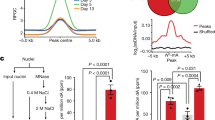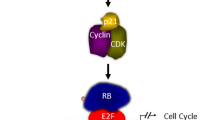Abstract
As a cyclin-dependent kinase inhibitor, p16INK4a plays a key role in cell cycle progression and cellular differentiation, and its expression is frequently altered in human cancers through epigenetically mediated transcriptional silencing. In this report, we demonstrate that p300 was able to induce cell cycle arrest, and this process was reversed by p16INK4a silencing by RNA interference in HeLa cells. We also show that p300 was involved in activation of p16INK4a expression in 293T cells. Specifically, p300 cooperated with Sp1 to stimulate both p16INK4a promoter activity and mRNA expression. Co-immunoprecipitation and mammalian two-hybrid assays revealed that p300 and Sp1 formed a complex through interaction between the Q domain of p300 and the N-terminal domain of Sp1. The chromatin immunoprecipitation assays verified that p300 was recruited to p16INK4a promoter, and the histone acetyltransferase domain of p300 participated in p16INK4a activation through inducing hyperacetylation of histone H4 at p16INK4a gene. These data suggest that p300 plays a critical role in transcriptional regulation of p16INK4a and in cell cycle arrest.
This is a preview of subscription content, access via your institution
Access options
Subscribe to this journal
Receive 50 print issues and online access
$259.00 per year
only $5.18 per issue
Buy this article
- Purchase on Springer Link
- Instant access to full article PDF
Prices may be subject to local taxes which are calculated during checkout








Similar content being viewed by others
References
Bond J, Jones C, Haughton M, DeMicco C, Kipling D, Wynford-Thomas D . (2004). Direct evidence from siRNA-directed ‘knock down’ that p16(INK4a) is required for human fibroblast senescence and for limiting ras-induced epithelial cell proliferation. Exp Cell Res 292: 151–156.
Chan HM, La Thangue NB . (2001). p300/CBP proteins: HATs for transcriptional bridges and scaffolds. J Cell Sci 114: 2363–2373.
Courey AJ, Tjian R . (1988). Analysis of Sp1 in vivo reveals multiple transcriptional domains, including a novel glutamine-rich activation motif. Cell 55: 887–898.
Deng Q, Li Y, Tedesco D, Liao R, Fuhrmann G, Sun P . (2005). The ability of E1A to rescue ras-induced premature senescence and confer transformation relies on inactivation of both p300/CBP and Rb family proteins. Cancer Res 65: 8298–8307.
Gizard F, Amant C, Barbier O, Bellosta S, Robillard R, Percevault F et al. (2005). PPAR alpha inhibits vascular smooth muscle cell proliferation underlying intimal hyperplasia by inducing the tumor suppressor p16INK4a. J Clin Invest 115: 3228–3238.
Han L, Lu J, Pan L, Wang X, Shao Y, Han S et al. (2006a). Histone acetyltransferase p300 regulates the transcription of human erythroid-specific 5-aminolevulinate synthase gene. Biochem Biophys Res Commun 348: 799–806.
Han S, Lu J, Zhang Y, Cheng C, Han L, Wang X et al. (2006b). Recruitment of histone deacetylase 4 by transcription factors represses interleukin-5 transcription. Biochem J 400: 439–448.
Kivinen L, Tsubari M, Haapajarvi T, Datto MB, Wang XF, Laiho M . (1999). Ras induces p21Cip1/Waf1 cyclin kinase inhibitor transcriptionally through Sp1-binding sites. Oncogene 18: 6252–6261.
Kondo Y, Shen L, Issa JP . (2003). Critical role of histone methylation in tumor suppressor gene silencing in colorectal cancer. Mol Cell Biol 23: 206–215.
Lee CW, Sorensen TS, Shikama N, La Thangue NB . (1998). Functional interplay between p53 and E2F through co-activator p300. Oncogene 16: 2695–2710.
Livak KJ, Schmittgen TD . (2001). Analysis of relative gene expression data using real-time quantitative PCR and the 2(−Delta Delta C(T)). Methods 25: 402–408.
Lu J, Sun H, Wang X, Liu C, Xu X, Li F et al. (2005). Interleukin-12 p40 promoter activity is regulated by the reversible acetylation mediated by HDAC1 and p300. Cytokine 31: 46–51.
Magdinier F, Wolffe AP . (2001). Sequence-specific DNA binding activity of RNA helicase A to the p16INK4a promoter. Proc Natl Acad Sci USA 98: 4990–4995.
Missero C, Calautti E, Eckner R, Chin J, Tsai LH, Livingston DM et al. (1995). Involvement of the cell-cycle inhibitor Cip1/WAF1 and the E1A-associated p300 protein in terminal differentiation. Proc Natl Acad Sci USA 92: 5451–5455.
Ohtani N, Zebedee Z, Huot TJ, Stinson JA, Sugimoto M, Ohashi Y et al. (2001). Opposing effects of Ets and Id proteins on p16INK4a expression during cellular senescence. Nature 409: 1067–1070.
Owen GI, Richer JK, Tung L, Takimoto G, Horwitz KB . (1998). Progesterone regulates transcription of the p21(WAF1) cyclin-dependent kinase inhibitor gene through Sp1 and CBP/p300. J Biol Chem 273: 10696–10701.
Pore N, Liu S, Shu HK, Li B, Haas-Kogan D, Stokoe D et al. (2004). Sp1 is involved in Akt-mediated induction of VEGF expression through an HIF-1-independent mechanism. Mol Biol Cell 15: 4841–4853.
Ray S, Sherman CT, Lu M, Brasier AR . (2002). Angiotensinogen gene expression is dependent on signal transducer and activator of transcription 3-mediated p300/cAMP response element binding protein-binding protein coactivator recruitment and histone acetyltransferase activity. Mol Endocrinol 16: 824–836.
Ruas M, Peters G . (1998). The p16INK4a/CDKN2A tumor suppressor and its relatives. Biochim Biophys Acta 1378: F115–F177.
Rumi M, Koichiro M, Tukuru U, Seiichi M, Yasunobu A, Junji N et al. (2003). p16INK4a induces differentiation and apoptosis in erythroid lineage cells. Exp Hematol 31: 355–362.
Ryu S, Zhou S, Ladurner AG, Tjian R . (1999). The transcriptional cofactor complex CRSP is required for activity of the enhancer-binding protein Sp1. Nature 397: 446–450.
Serrano M, Hannon GJ, Beach D . (1993). A new regulatory motif in cell-cycle control causing specific inhibition of cyclin D/CDK4. Nature 366: 704–707.
Suzuki T, Kimura A, Nagai R, Horikoshi M . (2000). Regulation of interaction of the acetyltransferase region of p300 and the DNA-binding domain of Sp1 on and through DNA binding. Genes Cells 5: 29–41.
Voorhoeve PM, Agami R . (2003). The tumor-suppressive functions of the human INK4A locus. Cancer Cell 4: 311–319.
Xiao H, Hasegawa T, Isobe K . (2000). p300 collaborates with Sp1 and Sp3 in p21(waf1/cip1) promoter activation induced by histone deacetylase inhibitor. J Biol Chem 275: 1371–1376.
Yao TP, Oh SP, Fuchs M, Zhou ND, Ch'ng LE, Newsome D et al. (1998). Gene dosage-dependent embryonic development and proliferation defects in mice lacking the transcriptional integrator p300. Cell 93: 361–372.
Zhao Y, Sun H, Lu J, Li X, Chen X, Tao D et al. (2005). Lifespan extension and elevated hsp gene expression in Drosophila caused by histone deacetylase inhibitors. J Exp Biol 208: 697–705.
Acknowledgements
This work was supported by grants from The National Basic Research Program of China (2005CB522404, 2006CB910506) and from the Program for Changjiang Scholars and Innovative Research Team (PCSIRT) in Universities (IRT0519) and the National Natural Science Foundation of China (30671184).
Author information
Authors and Affiliations
Corresponding author
Rights and permissions
About this article
Cite this article
Wang, X., Pan, L., Feng, Y. et al. p300 plays a role in p16INK4a expression and cell cycle arrest. Oncogene 27, 1894–1904 (2008). https://doi.org/10.1038/sj.onc.1210821
Received:
Revised:
Accepted:
Published:
Issue Date:
DOI: https://doi.org/10.1038/sj.onc.1210821
Keywords
This article is cited by
-
Experimental analysis of bladder cancer-associated mutations in EP300 identifies EP300-R1627W as a driver mutation
Molecular Medicine (2023)
-
Histone Deacetylation in the Promoter of p16 Is Involved in Fluoride-Induced Human Osteoblast Activation via the Inhibition of Sp1 Binding
Biological Trace Element Research (2019)
-
Reducing histone acetylation rescues cognitive deficits in a mouse model of Fragile X syndrome
Nature Communications (2018)
-
The interplay between p16 serine phosphorylation and arginine methylation determines its function in modulating cellular apoptosis and senescence
Scientific Reports (2017)
-
FOXC1, a target of polycomb, inhibits metastasis of breast cancer cells
Breast Cancer Research and Treatment (2012)



